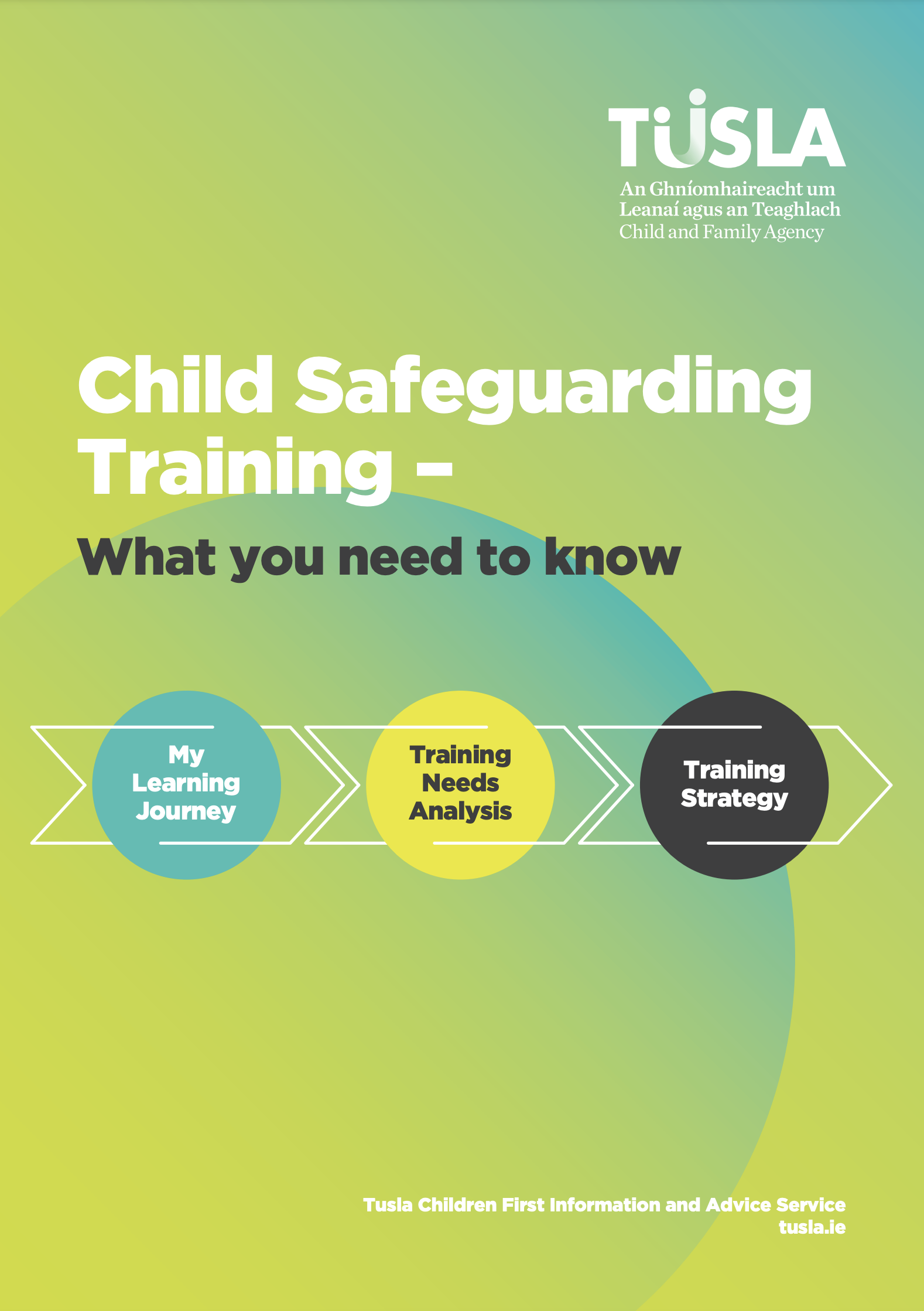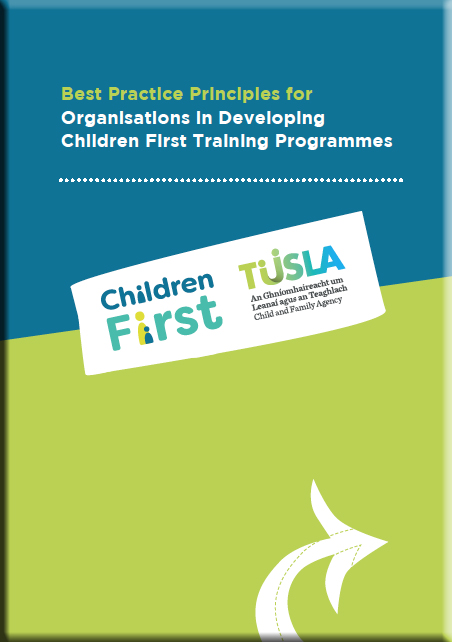Support Documents
Tusla has produced a suite of information documents and a universal elearning programme to support the launch of the revised Children First: National Guidance for the Protection and Welfare of Children and the commencement of remaining sections of the Children First Act 2015.
A Guide for the Reporting of Child Protection and Welfare Concerns (Irish version)
This guide is intended for people who have ongoing contact with children and / or families through professional, voluntary or other roles and who are classified as mandated persons under the Children First Act 2015. Under the Children First Act 2015, mandated persons must:
- Report harm of children above a defined threshold to Tusla;
- Help Tusla, if requested, in assessing a concern which has been the subject of a mandated report.
Mandated persons include professionals working with children in the education, health, justice, youth and childcare sectors. Foster carers are also classified as mandated persons. A full list of mandated persons is available here.
This Guide will help you when considering reporting a child protection or welfare concern to Tusla. It outlines the Children First principles of practice and the importance of working together to protect children. Guidance is given on when and how to report a child protection or welfare concern to Tusla. Information is provided on how Tusla will respond to your report and on related issues, such as feedback to you as the reporter and record-keeping. Finally, it provides information on Tusla’s out-of-hours service, child protection and welfare training, and our complaints procedure.
The Guide should be read along with Children First: National Guidance for the Protection and Welfare of Children.
Best Practice Principles for Organisations in Developing Children First Training Programmes (Irish version)
This document sets out guidance to assist organisations in identifying and achieving specific child protection and welfare training for staff as identified in Children First: National Guidance. It includes information on:
- The requirements for organisations to provide child protection and welfare training for staff and volunteers;
- Tusla’s e-learning training programme ‘Introduction to Children First’;
- The roles of staff in safeguarding children;
- Suggested outlines for Children First training programmes;
- Best practice principles in the delivery and evaluation of training programmes.
Tusla has also developed an e-learning training programme called ‘Introduction to Children First’, which covers topics including:
- Recognising and reporting child abuse;
- The role of mandated persons;
- The responsibilities of organisations working with children to safeguard children;
- The role of designated liaison persons.
The programme is available to members of the public and organisations working with children and families and can be completed in approximately 90 minutes. Click here to access the e-learning.
 Guidance on Developing a Child Safeguarding Statement (Irish version)
Guidance on Developing a Child Safeguarding Statement (Irish version)
The Children First Act 2015 requires organisations that are providers of ‘relevant services’ to prepare a Child Safeguarding Statement. This is a written statement that specifies the service being provided and the principles and procedures to be observed to ensure, as far as practicable, that a child availing of the service is safe from harm. It also includes an assessment of risk of harm to a child while availing of your service and specifies the procedures in place to manage any identified risks.
This Guidance provides information for organisations required to develop a Child Safeguarding Statement, including an example template Child Safeguarding Statement.
A full list of 'relevant services' is available here.
 Mandated Assisting Protocol for Tusla Staff (Irish version)
Mandated Assisting Protocol for Tusla Staff (Irish version)
The Children First Act 2015 imposes a legal obligation on certain people called ‘mandated persons’ to report child protection concerns above a defined threshold to Tusla. Mandated persons are people who have ongoing contact with children and/or families and who, because of their qualifications, training and experience, are in a key position to protect children from harm. Mandated persons can also be mandated to assist Tusla in their assessment of child protection and welfare concerns about children who have been the subject of a mandated report.
Mandated assistance is the provision of verbal or written information or reports; attendance at any meeting arranged by Tusla in connection with an assessment of a child, e.g. a Strategy Meeting or a Child Protection Conference; and/or the production to Tusla of any document or thing.
A request for mandated assistance will only be made if it is judged to be in the best interests of the child; if the request is necessary and proportionate; and if it is believed that the mandated person is in a position to assist Tusla’s assessment of the concern.
The protocol sets out Tusla's internal processes for formally requesting assistance and for dealing with a refusal to assist or a failure to engage.
A full list of mandated persons is available here.
 Child Safeguarding: A Guide for Policy, Procedure and Practice (2nd Edition)
Child Safeguarding: A Guide for Policy, Procedure and Practice (2nd Edition)
Tusla's Child Safeguarding: A Guide for Policy, Procedure and Practice can assist you when developing a Child Safeguarding Statement. It is a best practice guide designed to help all providers of services to children and families to develop guiding principles and safeguarding procedures to keep children and young people using their services safe from harm.
 Child Safeguarding Training - What you need to know
Child Safeguarding Training - What you need to know
This document has been developed to assist organisations and solo practitioners, to identify and implement adequate and appropriate child safeguarding training and information for workers and volunteers. It also provides guidance on conducting a child safeguarding training needs analysis and developing a child safeguarding training strategy.
This document updates and replaces the information in Appendix 9 of Tusla’s Child Safeguarding: A Guide for Policy, Procedure and Practice (2nd Ed.).
 Child Protection and Welfare Report Form and Retrospective Abuse Report Form
Child Protection and Welfare Report Form and Retrospective Abuse Report Form
Tusla has two forms for reporting child protection and welfare concerns – the Child Protection and Welfare Report Form (CPWRF) and the Retrospective Abuse Report Form (RARF). The Child Protection and Welfare Report Form is to be completed and submitted to Tusla for concerns about children under the age of 18. The Retrospective Abuse Report Form is to be completed and submitted to Tusla for cases of adults disclosing childhood abuse.
Child Protection and Welfare Practice Handbook 2
 The Child Protection and Welfare Practice Handbook 2 is published as a companion document to the 2011 HSE Child Protection and Welfare Practice Handbook and Children First: National Guidance for the Protection and Welfare of Children (DCYA 2017).
The Child Protection and Welfare Practice Handbook 2 is published as a companion document to the 2011 HSE Child Protection and Welfare Practice Handbook and Children First: National Guidance for the Protection and Welfare of Children (DCYA 2017).
Practice Handbook 2 is for use by front-line social workers, their line managers and other professionals. It provides information on a number of circumstances that may make children more vulnerable to harm. Practice Handbook 2 is divided into four sections, following the categories identified in Children First: National Guidance (DCYA 2017: 11–12) and provides a short description of each topic area, followed by some key messages from research and a practice note to assist professionals in making evidence informed decisions and judgements.


